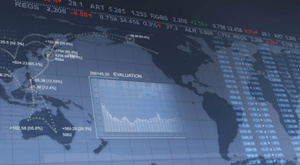Chinese factory data helping to lift world stocks
Shanghai Daily via agencies, June 3, 2014 Adjust font size:
Reassuring Chinese factory data and another record high for Wall Street lifted world stocks and commodities yesterday, as markets waited to see how far the European Central Bank will go with policy easing plans this week.
The euro fell against the dollar, as subdued inflation readings in Germany and slower-than-expected manufacturing growth in the eurozone piled pressure on the ECB to act aggressively when it meets on Thursday.
Shares and commodities rose globally however, as a rebound in Chinese manufacturing data helped soothe jitters about its economy following a wobble in the early months of this year.
Germany’s DAX stock index closed in on 10,000 points for the first time, while gains elsewhere in Europe and a 2 percent jump for Tokyo’s Nikkei left MSCI’s world index edging to an all-time high.
Futures prices pointed to the momentum just about holding for the start of US trading, where the S&P 500 and Dow Jones Industrial both begin what will be a busy week.
The main event will be the ECB’s meeting on Thursday after weeks of frenzied speculation about rate cuts and other policy measures.
Like many, Societe Generale expects the central bank to cut rates and start charging banks that deposit cash with it, but unlike most, it also expects a far more aggressive 300 billion euro (US$400 billion) Asset Backed Securities purchase program to be announced.
“We are expecting quite a slew of measures from the ECB,” Societe Generale FX strategist Alvin Tan said.
“In our view all the rate cuts are priced in, even a negative deposit rate, but an asset purchase program is probably not, so that would weaken the euro,” he said.
The euro fell 0.2 percent to hit US$1.3595 in the European session, not far from a three-month low of US$1.3586 touched last Thursday. It also fell against sterling to 81.15 pence, with diverging monetary policy outlooks between the ECB and the Bank of England underpinning the pound.
Extra pressure
Though the US Federal Reserve, Bank of England and Bank of Japan have long been using near-zero interest rates, the ECB is expected to go a step further and bring in a “negative deposit rate” by which it would charge banks who hoard spare cash.
Extra pressure for the ECB to act aggressively came from German annual inflation data, which showed a slowdown to its weakest rate in nearly four years in May.
European bonds continued to perform strongly and in Asia, the positive sentiment spilling over from China helped the Nikkei and saw Australian shares add 0.3 percent.
China’s factory activity expanded at the fastest pace in five months in May, reinforcing views that its economy is regaining traction following support from the government.
“It’s certainly a good sign to see the PMI starting to pick up, which suggests that the Chinese fine-tuning of policies is starting to gain a bit of traction which is a positive for industrial commodities,” National Australia Bank analyst James Glenn said yesterday.


